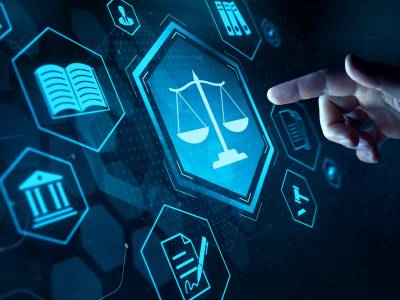How will law firms of the future use technology to improve their services for clients? How can attorneys use algorithms to predict court decisions? And how can artificial intelligence help lawyers to be more efficient in their daily work?
Technology is significantly transforming the provision of legal services in several ways. It has enabled automation of repetitive and mundane tasks, such as document review, contract drafting, and legal research. This reduces the time and effort required for these tasks, leading to increased efficiency and cost savings for both lawyers and clients.
But while technology brings significant benefits, it also presents new ethical, regulatory, and skill-related challenges for legal professionals. To help lawyers adapt to these changes, a whole host of law schools are now running specialist LL.M. programs in Legal Technology.
They focus on how technology is increasingly being used to provide legal services (legal tech), rather than the legal issues raised by the rapid advancement of technology (technology law). As such, an LL.M. in Legal Technology provides specialized expertise that is highly valued in today’s tech-driven world.
The programs below emphasize the application of emerging technologies in the legal sector. You’ll explore topics such as artificial intelligence, blockchain, data protection, privacy, and intellectual property, enabling you to stay at the forefront of technological advancements and their legal implications.

IE Law School’s LL.M. in Legal Tech offers a specialized curriculum that focuses specifically on the intersection of law and technology. The program covers a wide range of topics relevant to legal tech, including artificial intelligence, blockchain, cybersecurity, data protection, legal innovation, and more.
View School Profile
Students on the Master of Law and Business at the Germany-based Bucerius Law School can take a Legal Technology Specialization, which consists of one module, an internship in the area of Legal Technology, and the writing of a master’s thesis focused on the topic.
View School Profile
The LL.M. LegalTech and Commercial Law program at Swansea University blends two important areas of study, legal technology (LegalTech) and commercial law, providing participants with a comprehensive understanding of both fields. You’ll also have opportunities to work on real-world legal challenges through case studies, projects, and interactive exercises.
View School Profile
The Technology Law & Policy at Georgetown University Law Center offers a specialized curriculum focused specifically on technology law and policy. Students participate in a weekly seminar and practical project focused on the varied uses of computer technologies in the practice of law -- specifically those that at enhance access to justice.
View School Profile
The LL.M. program in Innovation, Law and Technology at University of Toronto covers a wide range of topics related to innovation and technology law. That includes a course on Legal Technology and Informatics, which explores how technology is currently used in legal practice and how its evolution will continue to shape the legal profession.
View School Profile
Queen Mary University of London runs the LL.M. in Technology, Media, and Telecommunications Law. It includes a Legal Tech module that examines the theory and application of technology to legal practice and procedures, including how AI is being to provide substantive legal advice, procedural risk analysis, as well as contract and practice management.
View School ProfileRelated Articles
Law Schools Integrate Artificial Intelligence into Curricula
Aug 29, 2024
Law schools across the world are increasingly incorporating AI-focused courses and degree programs into their curricula.
From Algorithms to Antitrust: Study an LL.M. in Technology Governance
May 10, 2024
As technology reshapes our world, LL.M. programs are equipping lawyers with tools for the digital age.











